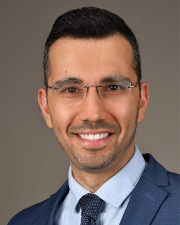Michael Issa Nahhas, MD

Vascular and Interventional Neurologist
Assistant Professor
Dr. Nahhas Sees Patients at:
UTHealth Houston Neurosciences Neurology – Memorial City
915 Gessner, Medical Plaza 3, Suite 600
Houston, TX 77024

Dr. Michael Nahhas is an assistant professor of neurology at McGovern Medical School at UTHealth Houston and a board-certified vascular neurologist who specializes in neuroendovascular interventions to manage vascular conditions of the brain and spinal cord.
After receiving his medical degree from Damascus University Faculty of Medicine in Syria, he completed a neurosurgery residency at Homs National Hospital and Ibn Al-Nafees Hospital of Damascus. He then served as a postdoctoral research fellow at the Brain and Vision Research Laboratory at Boston University and as a research assistant at the Neurology of Vision Laboratory at Massachusetts General Hospital in Boston.
He completed an internal medicine internship and served as chief resident of neurology at the Medical College of Georgia at Augusta University. He also completed fellowships in vascular neurology at the Medical University of South Carolina in Charleston and cerebrovascular and endovascular neurosurgery at UTHealth Houston.
Dr. Nahhas’ clinical interests include treating brain aneurysms and vascular malformations, including arteriovenous malformations (AVMs), arteriovenous fistulas (AVFs), and cavernous malformations. Research interests include neuroendovascular device clinical trials, advanced neuroimaging in cerebrovascular diseases, and exploring novel endovascular techniques in treating cerebrovascular conditions.
He is an active member of the American Heart Association/American Stroke Association, the Society of Vascular and Interventional Neurology, and the Society for Neurointerventional Surgery.
Dr. Nahhas is fluent in English and Arabic.
Collaboration with Referring Physicians
Physicians at UTHealth Houston Neurosciences engage referring physicians in the care of their patients, keeping them informed throughout the evaluation and treatment process. After treatment, referring physicians receive a summary and a plan for follow-up. We encourage continued communication about each patient.
Languages Spoken:
English, Arabic











